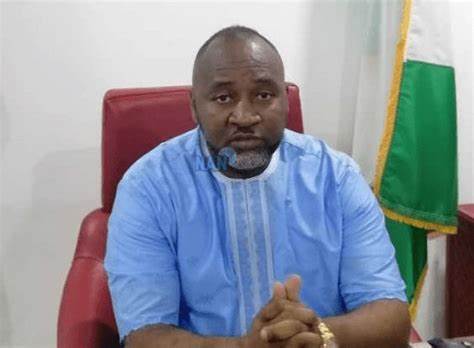The African Democratic Congress (ADC) has officially expelled its 2023 presidential candidate, Dumebi Kachikwu, following accusations that he deliberately worked to undermine the party’s coalition efforts.
The party’s founder, Ralph Nwosu, confirmed the expulsion during a recent interview on ARISE Television, stating that the party no longer wants Kachikwu as a member.
Nwosu alleged that Kachikwu had been acting as the primary agent working against the party’s coalition consolidation efforts, claiming he received funding from various sources to finance activities aimed at derailing their political alliance. The ADC founder emphasized that while the party’s National Executive Committee had pardoned other members involved in similar activities, Kachikwu’s case was deemed unforgivable.
“He has been the number one agent that is collecting resources from anywhere and funding the process to derail what we are doing as far as consolidating our coalition is concerned,” Nwosu stated during the television interview. The party leader expressed particular frustration with what he described as Kachikwu’s systematic efforts to sabotage the coalition from within.
The ADC founder also directed criticism at the ruling All Progressives Congress (APC), suggesting that instead of engaging in fair political competition, the party was attempting to undermine opposition coalitions through various means. Nwosu indicated that there were individuals within the APC who believed they could disrupt coalition efforts through financial incentives, though he claimed these attempts had ultimately failed.
Despite the internal challenges, Nwosu highlighted the ADC’s growing popularity and membership base. He revealed that the party’s online registration system experienced such overwhelming demand that it crashed twice and had to be relocated to foreign servers, including Amazon’s cloud infrastructure. The surge in membership applications reportedly necessitated sophisticated technical solutions to handle the volume.
The party founder cited a specific example of this growth, mentioning that Babachir Lawal had requested 2.5 million membership cards for the Northeast region alone, a dramatic increase from the 500 cards purchased just two weeks earlier. This exponential growth in membership interest appears to reflect the party’s expanding influence in Nigerian politics.
The expulsion of Kachikwu represents a significant development within the ADC as it continues to position itself as a major opposition force. The party’s decision to remove its former presidential candidate suggests a commitment to maintaining internal unity and protecting its coalition-building efforts from perceived sabotage.
This internal conflict within the ADC comes at a time when opposition parties in Nigeria are increasingly focused on forming strategic alliances to challenge the ruling party’s dominance.

















